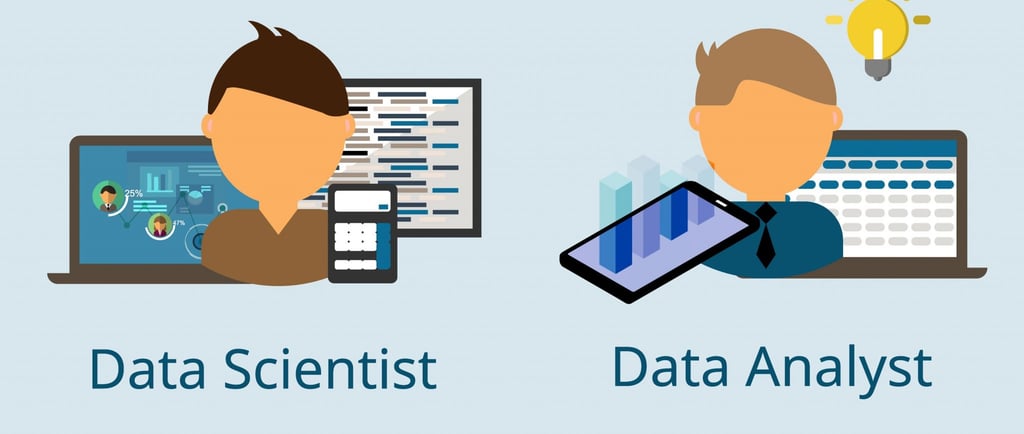Understanding the Differences Between Data Science and Data Analytics
DATA SCIENCE
7/25/20243 min read


Introduction to Data Science and Data Analytics
Data science and data analytics are two pivotal fields in the realm of data-driven decision-making, each offering unique methodologies and perspectives. Data science is an interdisciplinary field that integrates statistics, computer science, and domain expertise to extract meaningful insights from complex datasets. It involves a diverse range of techniques, including machine learning, predictive modeling, and data visualization, to uncover patterns and trends that inform strategic decisions. Data scientists often develop sophisticated algorithms and models, leveraging vast amounts of data to solve intricate problems and predict future outcomes.
Data analytics, on the other hand, is the process of systematically examining datasets to draw actionable conclusions. It focuses on interpreting existing data to understand historical trends, identify anomalies, and evaluate performance. Data analysts typically use specialized tools and software to perform data mining, statistical analysis, and reporting. Unlike data science, which often involves the creation of new models and algorithms, data analytics is more concerned with the application of existing methods to analyze and interpret data.
Despite their differences, both data science and data analytics share a common goal: to enable data-driven decision-making. They strive to unlock the value hidden within data, providing insights that drive business growth, innovation, and efficiency. However, their approaches to achieving this goal vary. Data science delves deeper into the development of new methodologies and predictive capabilities, while data analytics emphasizes the application of these techniques to derive practical insights from current data.
Understanding the distinctions between data science and data analytics is crucial for organizations aiming to leverage data effectively. By recognizing the unique contributions of each field, businesses can better align their data strategies with their specific needs and objectives, ultimately enhancing their ability to make informed, strategic decisions.
Key Differences in Skills and Tools
Data science and data analytics, while closely related, require distinct skill sets and tools that reflect their unique focuses and scopes. Data science is often characterized by its broad, complex nature, necessitating expertise in machine learning, statistical modeling, and advanced programming languages. Proficiency in languages such as Python and R is crucial for data scientists, as these languages enable the development and implementation of complex algorithms and models. Data scientists frequently utilize tools like Jupyter Notebooks for interactive computing and TensorFlow for machine learning applications. Hadoop is another essential tool in their arsenal, offering robust data storage and processing capabilities suitable for handling large-scale datasets.
Conversely, data analytics is typically more application-oriented, focusing on the practical interpretation and visualization of data. Data analysts need strong skills in data visualization, statistical analysis, and a thorough understanding of business intelligence. Proficiency in tools such as Excel and SQL is fundamental for managing and querying data. Additionally, data visualization software like Tableau and Power BI is indispensable for creating comprehensive and interactive visual representations of data. These tools allow data analysts to extract actionable insights and effectively communicate their findings to stakeholders.
The divergence in skills and tools between data science and data analytics underscores the broader scope and complexity inherent in data science. While data scientists delve into developing predictive models and uncovering patterns through sophisticated algorithms, data analysts focus on interpreting these patterns and translating them into actionable business insights. This distinction highlights the complementary roles both fields play in the data ecosystem, each contributing unique expertise to drive informed decision-making and innovation.
Applications and Career Opportunities
Both data science and data analytics offer a wide range of practical applications and promising career opportunities, each catering to different interests and skill sets.
Data science is instrumental in fields such as artificial intelligence (AI), predictive analytics, and big data processing. AI applications, for instance, leverage data science to develop sophisticated algorithms that can learn from and interpret complex datasets. Predictive analytics enables businesses to forecast future trends and behaviors, enhancing decision-making processes. Big data processing involves handling and analyzing vast amounts of data to uncover hidden patterns and insights. Career roles in data science include data scientist, machine learning engineer, and data engineer. A data scientist typically focuses on designing and implementing complex models and algorithms. A machine learning engineer specializes in creating scalable machine learning systems, while a data engineer builds and maintains the infrastructure required for data generation, storage, and analysis.
On the other hand, data analytics primarily focuses on business intelligence, market analysis, and operational optimization. In business intelligence, data analytics helps organizations to transform data into actionable insights, supporting strategic decision-making. Market analysis involves examining market trends, consumer behavior, and competitive dynamics, enabling companies to tailor their strategies accordingly. Operational optimization uses data to enhance efficiency and productivity within various business processes. Career roles in data analytics include data analyst, business analyst, and BI analyst. A data analyst interprets data to identify trends and patterns, a business analyst focuses on improving business processes through data, and a BI analyst specializes in developing and managing business intelligence solutions.
The choice between pursuing a career in data science or data analytics largely depends on an individual's interests and strengths. Those who are inclined towards the technical and algorithmic aspects of data may find data science more appealing. Conversely, those who prefer the business and application-oriented side of data might be better suited for a career in data analytics.
Company
Free Subscribe to us
©Copyright 2023 DATADRIX All Rights Reserved.


Courses
Location : Dilshad Garden, New Delhi
Contact Us : +91 - 9310936989
